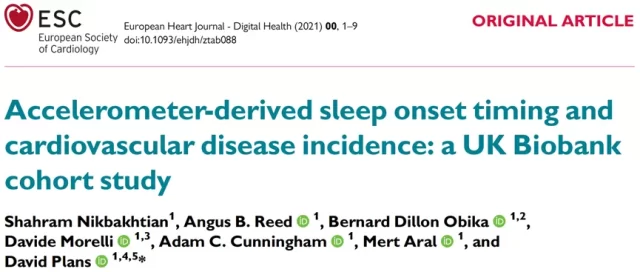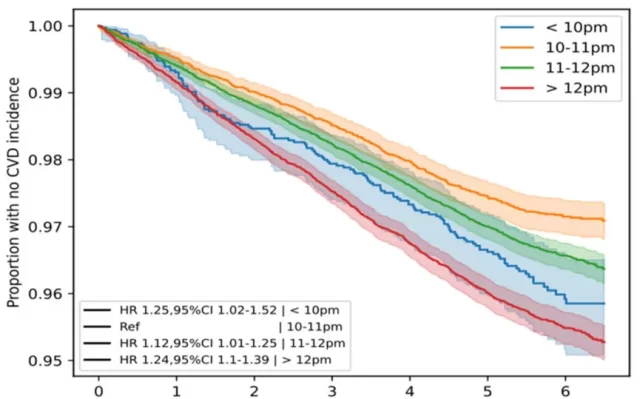EHJ: A study of nearly 90000 people tells you when you should go to sleep
- Why Lecanemab’s Adoption Faces an Uphill Battle in US?
- Yogurt and High LDL Cholesterol: Can You Still Enjoy It?
- WHO Releases Global Influenza Vaccine Market Study in 2024
- HIV Infections Linked to Unlicensed Spa’s Vampire Facial Treatments
- A Single US$2.15-Million Injection to Block 90% of Cancer Cell Formation
- WIV: Prevention of New Disease X and Investigation of the Origin of COVID-19
EHJ: A study of nearly 90000 people tells you when you should go to sleep
- Red Yeast Rice Scare Grips Japan: Over 114 Hospitalized and 5 Deaths
- Long COVID Brain Fog: Blood-Brain Barrier Damage and Persistent Inflammation
- FDA has mandated a top-level black box warning for all marketed CAR-T therapies
- Can people with high blood pressure eat peanuts?
- What is the difference between dopamine and dobutamine?
- How long can the patient live after heart stent surgery?
EHJ: A study of nearly 90000 people tells you when you should go to sleep.
Don’t miss the prime time to sleep! A study of nearly 90,000 people found that falling asleep at 10-11 pm is the healthiest, and going to bed early/late is associated with a 24% and 25% increased risk of cardiovascular disease
It’s a common sense that people should sleep early for better health, however, you don’t have to fall asleep at eight or nine o’clock at night. What’s the best time to begin sleeping?
The results of the study published in the European Heart Journal reminded that the prime time to fall asleep is between 10 and 11 pm. It is definitely not advisable to go to bed late, but it is not good to go to bed early .
David Plans and his colleagues from the University of Exeter, UK, found that falling asleep between 10pm and 11pm was associated with the lowest risk of cardiovascular disease (CVD), based on a prospective cohort study of approximately 88,000 people.
Falling asleep before 10 pm, falling asleep between 11 am and 12 pm, and falling asleep after midnight were significantly associated with a 24%, 12%, and 25% increased risk of CVD, respectively [1].
 Screenshot of the homepage paper
Screenshot of the homepage paper
When reading this article, Singularity Cake couldn’t help but think of a previous large retrospective cohort study on sleep duration – neither too little nor too much .
Sleeping less than six hours was associated with a 20 percent increased risk of myocardial infarction compared with those who slept six to nine hours, and sleeping more than nine hours was associated with a 34 percent increased risk [2].
From this point of view, in order to protect our cardiovascular system, simply sleeping has become a university question, and the sleeping time must be neither long nor short .
In addition, there are quite a number of studies that have demonstrated that insufficient sleep time is associated with an increased risk of CVD [3].
So what’s the point of falling asleep?
There are also many studies on going to bed late and staying up late, such as destroying collagen [4], destroying cognition [5], destroying the immune system [6], and destroying glucose tolerance leading to obesity [7].
Okay, we know it’s not good to stay up late! But if you only look at reducing the risk of CVD, is it really better to go to bed earlier at night?
So Plans and his colleagues selected 88,026 participants based on the UK Biobank, with an average age of 61 (43-79) and 58% women.
On the one hand, they obtained the participants’ sleep status (including sleep onset time, sleep duration, and sleep pattern) through a wearable wristband device.
On the other hand, through questionnaires, diagnosis and other survey results, the participants’ lifestyle, physical condition, and CVD prevalence were collected.
Here, the researchers categorized participants’ sleep onset time into four categories: <10:00 pm, 10:00 pm-10:59 pm, 11:00 pm-11:59 pm, ≥12:00 pm .
The disease was defined as the first occurrence of CVD events, including chronic ischemic heart disease, stroke, myocardial infarction, heart failure and transient ischemic attack, but not including death due to CVD.
During a mean follow-up of 5.7 years, 3172 participants (3.6%) developed CVD. Among them, 4.2% fell asleep at <10:00pm, 15% fell asleep at 10:00pm-10:59pm, 38% fell asleep at 11:00pm-11:59pm, and 43% fell asleep at ≥12 :00 pm Fall asleep.
After adjusting for participants’ age, gender, sleep duration, irregular sleep patterns, smoking, body mass index, diabetes, blood pressure, socioeconomic status and other multivariate factors , the researchers found that the time period of sleep onset was significantly associated with CVD risk.
There is indeed a significant correlation between the two, but it is not a linear relationship, but a U-shaped correlation .
The analysis results show that 10:00-11:00 pm is the golden sleep time period, and the risk of CVD is the lowest.
The risk of developing CVD is highest when staying up until after midnight .
Specifically, falling asleep at <10:00 pm was significantly associated with a 24% increased risk of CVD compared with falling asleep at 10:00 pm-10:59 pm (HR 1.24, 95% CI 1.10-1.39, P<0.005) , falling asleep at 11:00pm-11:59pm was significantly associated with a 12% increased risk of CVD (HR 1.12 95%CI, 1.01-1.25, P=0.04) , falling asleep ≥12:00pm was associated with an increased risk of CVD 25% higher was significantly associated (HR 1.25, 95% CI 1.02-1.52, P=0.03) .

The real girl thought that sleeping at <10pm is not as good as sleeping at 11-12pm
It is worth mentioning that women are more “sensitive” to the time period when they fall asleep .
After further analysis by gender, the researchers found that for women, falling asleep at <10:00 pm and ≥12:00 pm were associated with a 34% and 63% increased risk of CVD, respectively (HR 1.34, 95% CI 1.11- 1.61, P<0.005) (HR 1.63, 95%CI 1.20-2.21, P<0.005) .
For men, only falling asleep <10:00 pm was associated with a 17% increased risk of CVD (HR 1.17, 95% CI, 1.01-1.35, P=0.03) , and falling asleep at a later time was associated with an increased risk of CVD. There is no apparent correlation .

But let’s still say, whether it’s a man or a woman, just go to bed at 10-11pm and you’re done.
Overall, the researchers analyzed 88,026 people and found that the time to fall asleep is also quite particular, especially for women .
10-11 p.m. is the prime time to fall asleep, when the risk of CVD is the lowest . Falling asleep before 10 o’clock will not only not be “icing on the cake” and further reduce the risk, but it is similar to falling asleep after 12 o’clock in the middle of the night, which is significantly associated with a 24% and 25% increase in the risk of CVD, respectively .
Compared with men, women who went to bed too early and went to bed too late had a greater risk of CVD, increasing by 34% and 63%, respectively .
Although causality was not investigated in depth in this study, the findings are sufficient to support the use of sleep duration as an intervention for CVD risk, the researchers said. After all, sleeping is relatively cheap and easy to achieve compared to other interventions.
But then again, it’s really easy to do it if you don’t go to bed early, but is it really easy to do it if you don’t go to bed late?
references:
[1] Shahram Nikbakhtian, Angus B Reed, Bernard Dillon Obika, Davide Morelli, Adam C Cunningham, Mert Aral, David Plans, Accelerometer-derived sleep onset timing and cardiovascular disease incidence: a UK Biobank cohort study, European Heart Journal – Digital Health , 2021;, ztab088, https://doi.org/10.1093/ehjdh/ztab088
[2] Daghlas I, Dashti HS, Lane J, Aragam KG, Rutter MK, Saxena R, Vetter C. Sleep Duration and Myocardial Infarction. J Am Coll Cardiol. 2019 Sep 10;74(10):1304-1314. doi: 10.1016/j.jacc.2019.07.022. PMID: 31488267; PMCID: PMC6785011.
[3] Huang T, Mariani S, Redline S. Sleep irregularity and risk of cardiovascular events:
the multi-ethnic study of atherosclerosis. J Am Coll Cardiol 2020;75:991–999.
[4] CHANG J, GARVA R, PICKARD A, et al. Circadian control of the secretory pathway maintains collagen homeostasis[J]. Nature Cell Biology, 2020.
[5] Wang Z, Chen WH, Li SX, et al. Gut microbiota modulates the inflammatory response and cognitive impairment induced by sleep deprivation. Mol Psychiatry. 2021;10.1038/s41380-021-01113-1. doi:10.1038/s41380- 021-01113-1
[6] Dimitrov S, Lange T, Gouttefangeas C, et al. Gαs-coupled receptor signaling and sleep regulate integrin activation of human antigen-specific T cells[J]. Journal of Experimental Medicine, 2019: jem. 20181169. DOI: 10.1084 /jem.20181169
[7]Morris CJ, Yang JN, Garcia JI, et al. Endogenous circadian system and circadian misalignment impact glucose tolerance via separate mechanisms in humans. Proc Natl Acad Sci USA 2015;112:E2225–E2234.
EHJ: A study of nearly 90000 people tells you when you should go to sleep
(source:internet, reference only)
Disclaimer of medicaltrend.org
Important Note: The information provided is for informational purposes only and should not be considered as medical advice.



